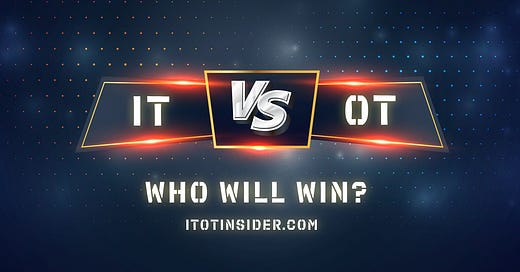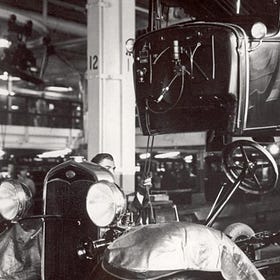When you work in manufacturing digitalization for a while, you feel the tension. Something underneath the success stories, proof of concepts that never scale out and empty promises of Industry 4.0, 5.0 or more. The tension between OT and IT, some even call it a conflict.
This post is for those who would like to explore what the fundamental differences are between both, regardless of your background (or is it allegiance?)
For the IT professionals
Finance, Supply chain, planning, communication, HR, marketing… IT is present in every business area in some way.
You’ve seen the world change, from IT as something for nerds in a small corner of the office to a critical part of every business. And since the pandemic even the local coffee shop suddenly needed an on-line marketing strategy.
Change is the only constant. From technologies to experimenting with new ways of working. 5 years is an eternity in IT.
As an OT professional
OT stands for Operational technology, technology with a focus on production control systems and automation. Your daily work is used to acronyms like PLC, DCS, SCADA, MES, APC and more and the shopfloor is your natural habitat.
Your world isn’t virtual, it’s real. Machines, production lines etc. You don’t “move fast, break fast” when you’re talking about food safety, dangerous equipment and even people’s lives that are at stake. This isn't somebody’s twitter feed.
So you put a premium on stability and proven solutions. Lifecycles of 20 years are the norm: If it ain’t broken, don’t fix it.
The key difference and some consequences - explored
We believe this is one of the major differences between IT and OT:
IT thrives on low marginal costs, OT does not have that luxury.
Size matters in IT, more than other sectors. One of the main reasons is that the marginal cost for growth is very low. Doubling your user base is nothing special in tech, even conservative. And with the advent of agile, lean and devops a small group of people can have a very large impact in no time.
OT however will always have one foot in the physical world.
Doubling your footprint usually means doubling your plant. And change is expensive: adding and removing wiring, reworking control loops, … all this requires a lot of (paper)work. No agile or DevOps approach can make OT as nimble as IT, it’s just the reality of the physical world.
Consequence 1 : OT loves customization, and it’s killing innovation
This one is a result of the previous point.
Exactly because change is so hard you end up with very customized solutions. You won’t change often so you want to have something that fits your needs, even if it costs more. You’ll be using it for a long time to come.
But this way of working is a barrier to innovation, regardless of what your DCS/SCADA/PLC vendor is trying to tell you (by the way, most often their newest innovations are about their licensing models, and we all know what that means). In an environment where stability is key and change is expensive innovation is hard. Want a good example? OPC UA launched the same year that Amazon launched AWS!
Consequence 2: IT will become dominant and OT will remain a cash cow
Software is eating the world, and manufacturing isn’t different from that.
The most nimble and adaptable will thrive. We haven’t reached the point yet that IT is able to manage OT data with the same ease and speed as it does with more ‘classical data’. But the moment it does, everybody will be rushing to get their data out of their OT systems and benefit from all the technologies and methodologies available in IT.
That doesn’t mean that suddenly plants will be empty and fully managed by AI algorithms in the cloud. But we’ll be a whole lot closer to it.
What does this mean for the traditional OT vendors? They’ll either play it safe, maximizing returns and be ready to get comfortable in their niche. Or take the risk to change their entire culture and try to be as nimble as IT startups and as influential as the IT giants, without losing their foothold in the OT space.
What now?
I’m not the boss of Microsoft or Amazon, so I don’t know when IT will break the walls around OT data and gobble it like all the other data.
But we can change the way we think and work and reap those benefits today.
While we aren’t there yet 100% from a technological point of view, we can start working on the culture. If the future of manufacturing digitalization is IT, wouldn’t it make sense to work and organize ourselves like they did? Or are you still managing the Henry Ford way?
Explore the differences further
The IT and OT view on data (Part 1)
In our relentless efforts in bringing together the IT and OT world, it is now time to see if we can find some common ground when it comes to storing data at scale. Making data accessible is a really (really) important topic. This is the starting point from which all your data projects will take off. If your data is difficult or not accessible, you can i…
IT/OT cooperation models
The day OT systems got connected to IT systems, cooperation was needed. But what is cooperation? How do you describe it? Enter Team Topologies, a way to think and talk about teams and how they interact introduced by Matthew Skelton and Manuel Pais.Thanks for reading The IT/OT Insider! Please, consider
Are you still managing the “Henry Ford”-way?
You must have lived on a desert island not to have come across the term "Industry 4.0" in recent years. It was the Buzzword of all Buzzwords in the period 2015-2020. You certainly started some 4.0 initiatives or you might even have created your 4.0 project team. Solution providers too had to jump on the bandwagon, if not they were quickly labeled "old s…
OT in the cloud
Every so often a manager or vendor will ask you: Why aren’t you running those OT / MES solutions in the cloud (or “my cloud”)? Let's see where the question comes from before we jump to an answer. Some history : What the switch to the cloud meant for IT









